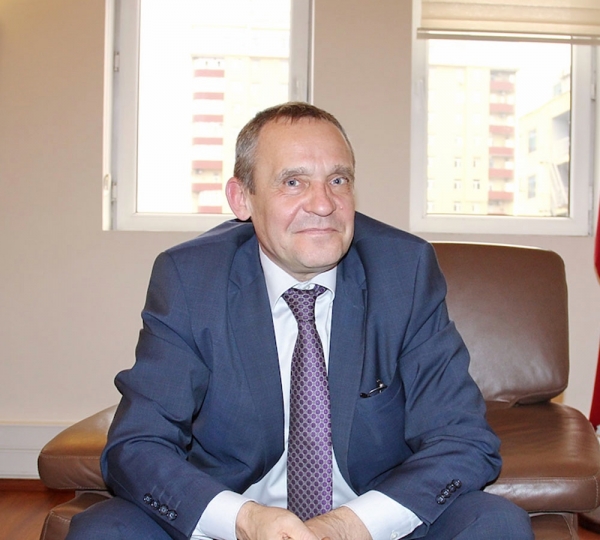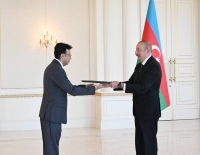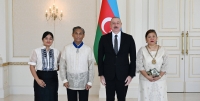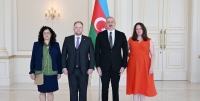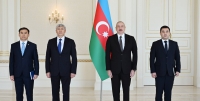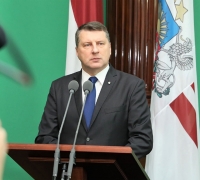Caspian Energy (CE): Your Excellency, the Caspian Sea and the Baltic, Azerbaijan and Latvia are the regions located far from each other. What has already been done and what remains to be done to achieve the economic convergence between the two regions and countries? What is the main problem in the present economic relations?
Juris Maklakovs, Ambassador Extraordinary and Plenipotentiary of Latvia to the Republic of Azerbaijan: Thank you for providing me an opportunity to share my views, experience and knowledge. I would like to note that on 11 January 2019, Latvia and Azerbaijan marked the 25th anniversary of establishment of diplomatic relations between the two states. Pretty much has been done throughout these 25 years. I will still stick to what I have said throughout the previous three years of my stay in Azerbaijan that we have established very good mutual relations on the political level, as evidenced by the signed agreements. In particular, I would like to highlight the Agreement on strategic partnership which was signed last year during the official visit of Azerbaijan’s President Ilham Aliyev to Latvia. During the visit, signed were also 5 agreements in the field of education, medicine, tourism, environment and other areas. We are working in the economic direction in order to improve the turnover. There are positive indicators. For instance, a Trade House of Azerbaijan in Latvia was opened in summer of 2018. 120 tonnes of the Azerbaijani agricultural products were supplied to Latvia in the first 6 months of 2018. The trade house provided an opportunity for business development because a platform for viewing goods and discussing issues of their export to Latvia has been established. Of course, the Trade House has just started operating and this process needs time to gain momentum and showcase real and tangible results.
In the meantime, speaking about reasons which slow down economic cooperation, I would like to note a few moments. For instance, a distance plays an important role in development of our trade relations. There is a Riga-Baku direct air flight, but it functions only for 6 months. In 2018 the flights were made for the first time from May till October. It is necessary to have this flight operating for the whole year.
The second moment concerns visas. Both Latvian and Azerbaijani citizens need visas to visit both Latvia and Azerbaijan. It slows down the development of tourism. Nevertheless, according to the feedback of those who applied for visas, the work of the newly introduced ASAN Visa is effective. If you ask a Latvian tourist which South Caucasian country he-she would like to visit, Georgia will probably be the first country as there is no visa required for going there. Besides, direct flights to Georgia are made all year round, while in the direction of Baku they are made no more than 6 months a year.
There is one more important factor left. We still know very few about each other. The following fact has surprised me. We invited 10 representatives of well-known Latvian tour operators and journalists to Baku. In the positive sense, they were very surprised and amazed at everything they saw here. They admired the history, architecture, art, traditions and the Azeri cuisine. That is to say, Latvian residents, even those who are engaged in tourism did not have information about the tourism potential of Azerbaijan. This suggests that we should work harder and more effectively over distribution of information about countries among the population, and familiarize residents of our countries with the tourism opportunities. It will create momentum for mutual tourist travels, establishment of new contacts and business relations. Despite the existing problems, we will stay positive and make all efforts to solve these matters. We will not reduce the distance between our countries, but realizing an idea about direct Riga-Baku air flight all year round is quite real. This can be seen also in figures showing an 80% increase of the air travelers in 2018 vs 2017. Of course, the increase of the period of flights from 3 up to 5.5 months in 2018 also contributed into this indicator. But it also implies that the flight is needed.
I am pleased to note about the establishment of good and stable relations between our countries, but we should continue working to increase turnover and ensure further development of economic relations. There are thoughts, projects and opportunities. We only need to realize them.
CE: In which areas are there joint projects?
Juris Maklakovs: For instance, milkmen from Azerbaijan applied to me in order to develop projects in this field. I also would like to note that architects and representatives of the restaurant business from Latvia are now working actively and fruitfully in Baku.
As a small country, Latvia is more oriented towards the small and medium business. We have a lot of small businesses where the number of workers does not exceed 20-30 people. Azerbaijan is trying to seek large entrepreneurs for cooperation and interested in large projects and investments. In the meantime, objectives to diversify and develop small and medium business have been set. And it is this area where we can successfully develop cooperation as well. There must be more interaction and cooperation between small and medium employers of our countries.
Negotiations on strategic partnership are now underway with the European Union, which features very many integral parts, many economic issues and nuances regarding the “free market”.
CE: What is the situation regarding the bilateral trade turnover? Has the declining trend been stopped? What is the size of mutual investments of the two countries?
Juris Maklakovs: Goods turnover between our countries totaled 15.55million euros within 9 months of 2018. It rose by 20.64% (or by 2.66 million euros) as compared to the same period of 2017. It is a positive exchange of goods for Latvia. Of the total amount, the size of export from Latvia to Azerbaijan makes 15.36 million euros and the growth over this period totaled 3.56 million euros. That is to say, the size of export carried out by the Latvian entrepreneurs to Azerbaijan is much more than the size of import (186,857 euros).
It means that the assortment and the volume of products presented in the Trade House of Azerbaijan in Latvia should be extended and it is necessary to make more efforts to increase export of goods and services from Azerbaijan to Latvia, especially when there is a potential for that.
As far as direct investments are concerned, 12 million euros have been invested in Latvia in the 6 months of 2018, while less than 1 million euro has been invested into Azerbaijan. Now there are about 130 enterprises operating in Latvia jointly with the Azerbaijani entrepreneurs. There is no such amount of joint ventures operating in Azerbaijan.
CE: What stage has the development of the Zubr, Viking and Baku-Tbilisi-Kars projects reached? Do the Baltic companies see necessity in this today?
Juris Maklakovs: For many years I have heard political statements on this issue, but something has to be transported in order to make these linkages. In addition to the political will, there must be agreements signed. Entrepreneurs, who will be engaged in transportation and be interested in making this transportation, should be attracted and worked with. And it is preferable to have transportation running in both directions. If there is no cargo and demand for transportation but only a desire and a transport corridor, it will not suffice. There should be relevant agreements, contracts and accordingly a real demand for making this transportation within the framework of mentioned projects.
Nevertheless, Latvia is interested in transit of goods from China and India to the Latvian ports, using the North-South transport corridor.
These issues are being solved and in summer of 2018 Riga hosted interstate negotiations. In the course of the negotiations the Minister of Transport of Latvia and Deputy Minister of Economy of Azerbaijan discussed issues of transit. The parties expressed a wish to work harder in this direction to increase cargo flow on these lines. Negotiations are held also on the level of railway agencies of these two countries.
CE: How do you coordinate your work with the representation of the EU in Azerbaijan and to what extent is this interaction effective?
Juris Maklakovs: I think that the European Union is working very actively, as evidenced by the conduction of negotiations on the new agreement, which can be completed next year. The EU states represented in Azerbaijan are taking an active part in the joint discussions, conduct regular discussions and consultations on current issues. We are trying to raise awareness of the Azerbaijani community about the work carried out during the trips to regions, for instance, to Nakhchivan, Lankaran, Shaki, Ganja and other regions.
The EU countries are participating in many so called twinning-projects. Now Latvia is involved in two such projects which help to improve the system of education and certification. Other projects had also been implemented prior to that, including security and construction projects. Many leaders of the European countries visited Azerbaijan in 2018. Negotiations starting from implementation of large energy and investment issues up to small projects were held. That is to say, the European Union is working actively and well.
CE: Latvia is firmly linked to the energy markets of Estonia and Lithuania, as well as Poland and Finland. What are the today’s components of the energy security of Latvia and the Baltic region in general? How do you see the role of the Caspian region?
Juris Maklakovs: Matters of security and diversification of energy resources have been very relevant in the recent times both for the European Union and for Latvia as the EU member. Therefore, we are in favor of the diversification and are favorably disposed to the Southern Gas Corridor, TANAP and TAP projects because it provides an opportunity to supply gas to the European Union. The Baltic countries are striving to have similar gas prices in this region and little difference between them. A coordinating council, which is working over linking the gas system of the north countries with the Baltic region through connecting gas systems of Finland and Estonia, was created in the Baltic countries in 2015. This project has already been launched. It is planned that gas system of Finland will be linked to that of Estonia in 2020-2022. In this way, gas systems of the three Baltic countries will be linked to one another. Liquefied gas terminal has been built in Lithuania. Negotiations on their connection to general regional system are underway between Latvia and Lithuania. Therefore, we look positive at having the Southern Gas Corridor project completed and having gas from Azerbaijan delivered to the European Union because gas which is to be supplied to the European Union will also be available to Latvia and the Baltic states.
CE: How is it going with the development of relations in the field of tourism? Which necessary measures have already been taken and which ones are still left?
Juris Maklakovs: My talks with the travel operators which visited Azerbaijan in October 2018 show that Latvian large tourism companies do not have enough information about the tourism potential of Azerbaijan. People engaged in tourism business were pleasantly surprised with the tourism potential of Azerbaijan – even despite the fact that within a three day of their stay in Azerbaijan they managed to see only Baku and its vicinities. The Gobustan state historical reservation, located 60km of Baku, was the most distant point visited by them.
But the tourism potential of Azerbaijan is not limited to Baku and the Absheron peninsula. One can visit south districts – Lankaran, Astara, north districts, especially Shaki where there are lots of interesting things, and many other parts of the country. After the Latvian journalists have visited Azerbaijan, very many fascinating and interesting articles were published in Latvia telling about what impression a trip to Azerbaijan and Baku made on them, how they familiarized with traditions of the Azerbaijani people and the Azeri cuisine. These articles placed in the internet portals, journals and newspapers are very positive. I believe that those who have read these articles will definitely remember that while planning holiday for the next year.
Therefore we should tell more about Latvia here and Azerbaijan should raise, where possible, the awareness of the Latvian community about the tourism potential in Azerbaijan. Speaking about tourism, first of all we should focus efforts on spread of information, which will lead to further development of tourism.
Secondly, it is necessary to have a direct Riga-Baku air flight operating all year round. I know that AirBaltic together with AZAL plan to make flights for 6 months next year. I hope that indicators of the next year will let take a right decision and open a direct flight all year round. It will give momentum to activation of processes in the tourism field.
CE: Trade house of Azerbaijan has been opened in Riga since July. Are there plans on opening Trade House of Latvia in Azerbaijan? What work is carried out in this direction?
Juris Maklakovs: Yes, this issue has been discussed quite recently. The enterprises which are ready to deliver here their products have already been determined. Shipment of the Latvian products to the Azeri market started in 2018. They are sold in several trade points of Baku and Azerbaijan. It is Latvian candies, canned fish, meat and dairy products. Latvian goods are sold both in specialized shops and in the large supermarket chains. It shows that there are all preconditions for opening of the Trade House. Latvian entrepreneurs have already started supplying products - it is a part of the project which was launched in summer 2018 when the Trade House of Azerbaijan in Latvia opened. The thing is that the work on attraction of Latvian entrepreneurs for supply of products to Baku was commenced in parallel. Now we are discussing a matter on provision of the space for the Trade House where it will be possible to showcase the whole assortment of Latvian products coming to Azerbaijan and advertise new products.
We anticipate that it is the Trade House in Azerbaijan with which network supermarkets will be able to sign, in future, relevant agreements for supply of Latvian products. In near future we plan to invite a large group of entrepreneurs to Azerbaijan, who are engaged in logistics and transportation. A matter of coordination of transportation between the two trade houses will be discussed. It is important to have the transport, delivering cargoes from Latvia to Azerbaijan and vice versa, loaded equally in both directions. In this way, it will minimize transportation costs and optimize prices for sold products.
I really hope that the Trade House similar to the one operating in Riga will be opened in Baku next year. The Trade House will provide a broad assortment of products and be a place for entrepreneurs to sign mutually beneficial agreements for supply of products. It will also let increase the turnover volume between the countries.
CE: Biomass-based production is actively developing in Latvia. What will be the role of the renewable energy market in the energy balance of Latvia?
Juris Maklakovs: It is a very topical issue, the discussion of which is getting more active at the meetings of national leaders at all levels. If we look at the indicators of use of alternative sources of energy among the EU countries, Latvia is the third after Sweden and Finland.
Water resources of the country are actively used in the power production of Latvia. But in recent years there has been a stable trend of development of such types of energy as biomass, biogas, wind and solar energy. Thus, generation of alternative sources of energy in Latvia, including water sources, shall make 40% of common indicators by 2020. Noteworthy here is that this indicator in the EU countries makes 14-17%.
I would like to say that Minister of Ecology and Natural Resources Mukhtar Babayev is a new co-chair of the Azerbaijan-Latvia Intergovernmental Commission from the Azerbaijan’s side. We have already discussed issues related to development of alternative energy sources with the minister and he is expected to visit Latvia early in 2019. We will show him where and how we use biogas and biomass for energy production. Besides, waste processing is one of the issues that are of interest to the Azerbaijani side. Very good results have been achieved in Latvia in this direction. For instance, a project on waste processing at the landfill has been implemented, where biogas is produced out of waste treatment and used for heating hothouses where delicious tomatoes and cucumbers are grown up. It is one of the projects which we often mention and share with this positive experience. We will also introduce this project to the minister of Azerbaijan.
This experience of Latvia can be actively used in many countries, including in Azerbaijan. And we are ready to share this experience.
Thank you for the interview




